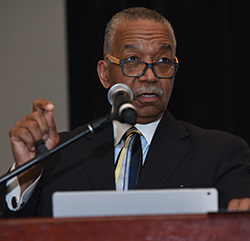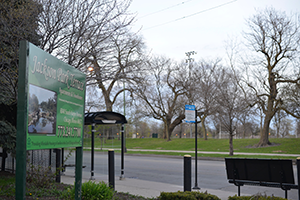
“There’s a French expression my dad used to use,” Dr. Byron Brazier, pastor of Apostolic Church of God, said to me via our telephone conversation about the Obama Presidential Library development. “It’s called noblesse oblige.”
He then asked me to explain what that phrase meant, knowing that I had studied French.
“Literally, it means the nobles are obligated.”
I continued to explain how I thought the expression applied to the plans for the Obama Library on the South Side.
“Aristocrats like you and your late dad (Bishop Arthur M. Brazier), The Woodlawn Organization co-founder Rev. Leon Finney (with Rev. Ulysses Blakeley Sr.) and Washington Park Rev. Torrey Barrett might feel you have an ethical responsibility to lead less-privileged community members to the Promised Land with your ‘wisdom in the palace; wisdom in the field.’ The problem with that, as citizens have told me, is that good intentions often have bad results when it’s top down and not bottom up.”
Brazier recalled that was the same argument community members raised when his father supported closing the “L” on the east side of Woodlawn. Community members then accused his dad of having noblesse oblige. Today, a new generation of community members are accusing the son of noblesse oblige because he is not publicly endorsing the Community Benefits Agreement (CBA) that would give more voice to the ordinary citizens regarding the Presidential Library, officially named the Barack Obama Presidential Center.
The CBA would guarantee that certain demands from the community are met during the construction of the center.

Brazier pushed his point. “History proved my dad was right. Compare how East 63rd where the train no longer goes looks compared to west 63rd where it does,” he said.
“I did. Both are relatively vacant,” I said.
He argued that west is more vacant and more crime-ridden than east because of his dad’s forethought and that history may record that his “leadership” shepherding the various stakeholders was the right thing to do at the right time in his dad’s era during the Civil Rights Movement. Today, he argues “the CBA is an affront to America’s first Black president – Obama. It suggests we don’t trust him.” (The Obamas are not the developers so technically the CBA wouldn’t apply to them; however, supporters of the CBA say the agreement would apply to the Obama Foundation). The fact Brazier maintains more power without this agreement was not mentioned in our cordial April 21 talk.
It seems as if it’s always about power – who’s got it and who doesn’t. And so the story begins. Welcome to Chicago politics – where back room meets living room. It’s where downtown interests and South Side interests collide. It’s also where multiple and intersecting classes within Chicago’s diverse African-American community sometimes clash. In this case, it’s the more middle-class east Woodlawn residents versus their more working-class west Woodlawn counterparts. Like everything else, it’s complicated.
Residents Demand Real Input

Notwithstanding the CBA, there’s a proposed community development board by the downtown-based Chicago Community Trust with its downtown consultant, City Hall partners and University of Chicago partners to recruit two community members from Woodlawn, two from Washington Park and two from South Shore to represent community concerns in a so-called “residents’ council.”
“Brazier, Finney and Barrett have already been selected by the powers-that-be and apparently, that selection or self-selection is pissing some off,” Woodlawn activist Ulysses “Buck” Blakeley Jr. said. He is the son of the co-founder of the Woodlawn Organization. “They have no more rights than the rest of us. We want real input, not symbolic. And while it’s OK for Brazier, Finney and Barrett to be at the table, they are not the main course. That’s our point. It’s not like it’s their world and we’re just passing through!”
For the past 10 days, I’ve been in boardroom meetings, community forums, online chats, telephone talks, email exchanges with publicists, leaders, activists, teachers, students, professionals, a rabbi and anyone else who could help this suburban reporter brought into this South Side story to objectively understand how to read the Obama Presidential Library development plans now brewing for 2018 groundbreaking at the proposed Jackson Park site at 60th to 63rd, Stony Island to Cornell. It’s a place where Hyde Park Academy students currently practice football, soccer, baseball, and where community residents enjoy sports and leisure- time activities including impromptu barbecues.
“Students and barbecuers will be forced to go elsewhere,” said former Woodlawn and 39-year South Shore resident Valerie Elkins, a former Miss Jamaica, who “distrusts” Brazier and Finney because of what she termed “their sordid past histories ignoring the less privileged in Woodlawn.”
Brazier flatly denies her claims. Brazier said Hyde Park students will be able to use sports facilities in nearby Jackson Park not far from the school. No word yet, though, on where the impromptu grillers we often see during the holiday season will go. There’s fear nothing west of the Library will be developed, some said, recalling how development west of the “L” closing never happened.
“This comes in a long line of Blacks being displaced, disrespected and being in spaces some deemed dangerous,” said Bronzeville Regional Collaborative spokesman Anton Seales. He was referring to how citizens who reside in low-rise, brown-brick buildings a couple miles west called Parkway Gardens are treated as “second-class” by folks who automatically associate them with tropes connected with poverty, violence, and crime. I recall as a kid when the complex first opened, soon-to-be residents proudly signed up to be on the Parkway Gardens list that was deemed upwardly-mobile, which was a conversation I had with environmentalist attorney Naomi Davis, who insisted “board members be appointed, not anointed” – a not-so-vague reference to Reverends Brazier, Finney and Barrett. Truth be told, a handful of violent Parkway Gardens residents have made the news.
Davis, along with others, shared their thoughts and concerns about the Presidential Library and Center at a recent public meeting at Hyde Park Academy.
The most poignant speaker, Linda Haywood, identified herself as a “former homeless woman who prayed for housing and was accepted into Jackson Park Terrace.” She told the spellbound crowd at the meeting, “While I’m pleased the Library will be across the street, I will not be moved!” She was the only speaker to receive a standing ovation at the April 18 meeting.
Others attending the meeting included South Shore advocate Dr. Carol Adams; Woodlawn activist Ulysses “Buck” Blakeley Jr.; Hyde Park Academy teacher Deb DeVaughn; activist Anton Seales; and Detroit-based activist-attorney Palestinian Rashida Tlaib.
Tlaib told skeptic citizens “Don’t believe the hype. Get it in writing.” Tlaib, who is with the Sugar Law Center where she works as community partnerships and development director, said in Arabic and English that her family hails from the Ramallah/Jerusalem area in the Occupied West Bank where many Detroit-area Arab Americans hail from. She said Arabs, Blacks, Asians, Native Americans, Whites and Latinos have had a bad example of how top-down development leaves their struggling community “devoid of the results” promised from polished politicians and preachers. She cited Baltimore as an example where residents “got screwed” and Nevada as where they did not. These were so-called “success stories” of Baltimore and Nevada shown early in the town hall meeting PowerPoint in what attendee Cassiette West-Williams sarcastically called “a marketing plan.”
According to West-Williams: “I am praying that the Obama Library brings renewal to my high school, Hyde Park Academy, and has programs and internships that allow young people to learn and earn credits in the future. I’m praying that both institutions will work together for the teens’ benefit,” she said, citing counselor Veronica Jackson’s statistics that this 154-year-old high school that used to have 2,200 has now decreased to 740 and “needs a boost.”
Mixed Feelings About the Library
Aldermen Leslie Hairston (who is a lawyer) and former cop Willie Cochran both represent Woodlawn. While I was unable to get a comment from Hairston, Cochran (presently under federal corruption investigation) wrote: “The residents have mixed feelings [about the Library]. Happy because of the promise of hope, jobs, safety and a vibrant community with more food choices. Temper that with fear of displacement and strangers they know nothing about.”
Woodlawn’s Rabbi Ramona Hernandez-Perez, a retired Northwestern University library researcher, wrote: “Minority communities of Chicago have been disappointed so many times before in savior-like projects, which turned out to be only a flash-in-the-pan deal. For the Library to be different, it must provide jobs, contractor, subcontractor and vendor opportunities during construction and through its lifetime.”
Activist Gabriel Piemonte said: “Well, the worst-case scenario is to look at it within a Chicago context historically — State Street, Maxwell Street, Block 37 — these ideas, these places where there are these grand ideas, parts of the community are torn up and then nothing happens and it takes years before anything happens.”
Piemonte said he was concerned that citizens would not be heard under Brazier’s visioning process. “You can go to these community meetings, but you get filtered out based on whether what you want is consistent with what his priorities are.”
More Transparency Needed
Meanwhile, noblesse oblige — the inferred responsibility of privileged people to act with generosity and nobility toward those less privileged – might be the calling of Brazier and Finney (who I was unable to get a comment from after several attempts) but most of the sources I spoke with from Washington Park (where Brazier lives), South Shore (“a crime-ridden, food desert” according to Elkins) where this reporter went to high school and Woodlawn (where Brazier’s mammoth church resides), argued they should “lead” Brazier, not the other way around. Even he admitted, “I’m not a representative. The alderman is. I’m an advocate. Everyone who lives and works here is an advocate.” As we concluded our telephone interview, he conceded “local residents have a good point about transparency, especially when it comes to the letting of contracts, and that community interests over corporate interests should win the day.” To their credit, even critics acknowledge that Finney and Brazier have done some good for Woodlawn.
“I was born and raised in Bronzeville. I live in Washington Park; my church is in Woodlawn. I have not lost my way,” Brazier said to community critics’ claims that he “sold them out.” He added: “That in the end those who are for the Community Benefits Agreement and those who are against it will probably meet somewhere in the middle since both groups want the Library and want what’s best for all the stakeholders.“
On that point, he could be correct.
President and Mrs. Obama to Host Invite-Only Community Event on the Obama Presidential Center
On Wednesday, May 3, 2017, President Barack Obama and Mrs. Michelle Obama will join Mayor Rahm Emanuel and community leaders for a community event on the Obama Presidential Center at the South Shore Cultural Center. President Obama will host a roundtable discussion to update the community on the progress of the Obama Presidential Center in Jackson Park and hear directly from members of the community on their ideas for the Center. The Chicago Tribune reports that the Obamas will be unveiling a model of the center. Audience tickets for this event are by invitation only.
[youtube https://www.youtube.com/watch?v=d2Q3xFpf-KE]